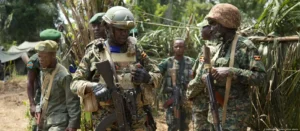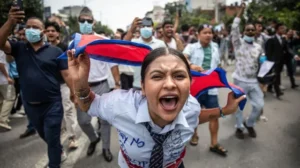Another devastating terror strike shakes the heart of Eastern Congo as violence continues to plague local communities. An Islamic State-backed group carried out a deadly church attack that claimed the lives of 21 innocent worshippers. This brutal incident highlights the ongoing security crisis affecting millions of civilians across the region.
Understanding the Latest Terror Strike Details
The attack occurred during Sunday morning worship services when congregants gathered for their weekly religious ceremony. Armed militants stormed the local church building, opening fire on defenceless civilians participating in peaceful worship activities. Local authorities confirmed that 21 people lost their lives during this senseless act of violence.
Witnesses describe scenes of chaos and terror as families scrambled for safety during the unexpected assault. Many victims included women and children who had come to worship alongside their loved ones peacefully. The attackers fled the scene immediately after carrying out their deadly mission against innocent civilians.
Emergency responders arrived hours later to assist survivors and transport the wounded to nearby medical facilities. Hospital staff worked tirelessly to treat those injured during the attack, though several victims remain in critical condition. Community leaders called for increased security measures to protect vulnerable religious sites from future attacks.
The Islamic State Connection and Regional Threat
Intelligence sources confirm links between the attacking force and broader Islamic State terror networks operating across Africa. The group responsible has claimed allegiance to the global terror organisation and adopted similar tactics. Their presence in Eastern Congo represents part of a wider pattern of extremist expansion across the continent.
This particular militant organisation has been active in the region for several years, targeting civilians and government forces. Previous attacks have focused on schools, markets, and other gathering places where large crowds provide maximum impact opportunities. Religious sites have become increasingly targeted as extremists seek to terrorise local communities effectively.
The Islamic State’s African affiliates continue expanding their influence through regional proxy groups and direct recruitment efforts. Young men facing poverty and limited opportunities often become vulnerable to extremist messaging and recruitment tactics. Economic instability and weak governance create ideal conditions for terror groups to establish operational bases.
Regional Security Challenges Facing Congo
Eastern Congo has struggled with persistent violence and instability for more than two decades following civil wars. Multiple armed groups compete for control over mineral resources and territory throughout the region continuously. Government forces lack sufficient resources and training to effectively counter these diverse security threats.
The area’s vast size and difficult terrain make it challenging for authorities to maintain a consistent security presence. Dense forests and mountainous regions provide ideal hiding places for militant groups seeking operational sanctuary. Limited infrastructure also hampers rapid response capabilities when attacks occur in remote locations.
International peacekeeping forces have maintained a presence in the region but face significant limitations in their operational scope. Local communities often feel abandoned by both national and international security providers who cannot guarantee their safety. This security vacuum allows extremist groups to operate with relative impunity across large territorial areas.
Impact on Local Communities and Religious Freedom
The church attack represents more than just another violent incident – it strikes at the heart of community life. Religious gatherings provide crucial social support networks for families struggling with poverty and displacement challenges. These attacks aim to destroy the social fabric that holds communities together during difficult times.
Fear now grips many religious communities as they question their safety during worship services and other gatherings. Some congregations have suspended regular activities or relocated to more secure facilities when possible alternatives exist. The psychological impact extends far beyond the immediate victims to affect entire communities deeply.
Key concerns facing religious communities include:
- Inadequate security at worship facilities
- Limited police protection in rural areas
- Difficulty accessing emergency medical services
- Ongoing threats against religious leaders
- Economic disruption from cancelled activities
Children particularly suffer when their normal routines and safe spaces become targets of violence and terror. Educational activities often connected to religious institutions face disruption, further limiting opportunities for young people already facing significant challenges.
Government Response and Security Measures
Congolese authorities condemned the attack and promised increased security measures for religious sites across the affected region. Military commanders announced plans to deploy additional troops to areas where extremist activity has increased recently. However, past promises of enhanced protection have often failed to prevent subsequent attacks effectively.
The government faces enormous challenges in addressing the root causes of extremist violence while managing immediate security needs. Limited budgets restrict the ability to maintain an adequate military presence across such vast territorial expanses continuously. Corruption and poor governance also undermine public confidence in official security capabilities.
International partners have offered assistance through training programs and equipment support for Congolese security forces operating in affected areas. However, sustainable solutions require addressing the underlying issues of poverty, weak governance, and social inequality that extremists exploit effectively.
Looking Forward: Hope Amid Ongoing Struggles
Despite this latest tragedy, local communities demonstrate remarkable resilience and determination to maintain their way of life. Religious leaders continue serving their congregations while calling for peace and reconciliation among all groups within society. Community organisations work tirelessly to support victims’ families and promote healing after traumatic events.
The 21 innocent lives lost in this attack serve as a stark reminder of the human cost associated with extremist violence. Their memory should inspire renewed efforts to address the conditions that allow such groups to operate and recruit successfully.
Recovery efforts will require sustained commitment from local communities, national authorities, and international partners working together toward lasting peace and stability.








Be First to Comment